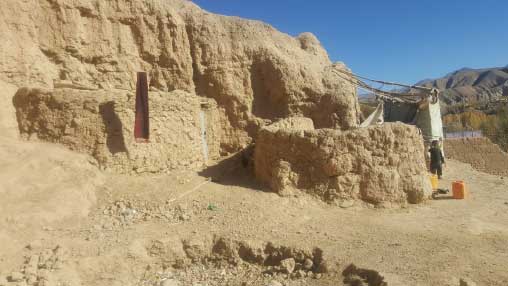BAMYAN CITY - Zahra, a young woman, spending her life along with her family, in a cave in central Bamyan province, is hemmed in by a whole host of problems
She cited decades of war as the only reason for them to live in such a confined space. With the restoration of peace, she believes, they will be able to walk out this jail-like dwelling.
About 3,000 caves exist around the ruined Buddha statues in Bamyan City. Dozens of poor families are still living in caves in central Afghanistan, particularly in Bamyan province.
They have no option but to live there at a time when people are looking for spacious and cozy home. And some go as far as to build mansions on water.
The cave dwellers say poverty and homelessness have forced them to reside in places, without access to water, electricity and other elemental amenities.
Post marriage, Zahra, 35, started living in a cave with her husband and four children. She vainly hoped for a better tomorrow.
The carpet inside the cave, where Zahra is living, is made of tattered papers and plastic.
A resident of Saighan district, she got married without her consent about 10 years ago. She did not have any idea about her life-partner living in a cave.
She cited economic problems and insecurity as a reason behind her forced marriage. “My parents were killed in the conflict and I lived with my uncle.
“One day, a person came and popped the question. My uncle accepted the proposal without seeking my consent. I didn’t know that my fiancé was troglodyte.”
Her husband was daily-wager, earning 50 to 100 afghanis. But at times, she explained, her spouse earned nothing hundred and they had to go to bed on an empty stomach.
Breaking into tears, she said: “We eat fresh in the evening. In the morning and at noon, we have to be content with consuming dry bread.”
Sitting near the cradle of her small son, she voiced deep concern about the future of her children. But at the moment, there is little hope for a better future for them.
She always thinks how to get rid of her situation and have a better future for her children? I always think is it possible to have a better life such as having a proper house, food and household goods, or will it remain a dream?
Zahra’s children, who like dozens of other children, have been unaware of life comforts in the caves. They play games daily in this muddy place.
Zahra wishes her children study and become educated, but achieving this dream would be possible if peace and stability returns to the country.
She said, “My only wish is to get out of this cave, we want peace, a peace that brings stability so we have a peaceful life and we may be saved from this misery and witness a day when we come out from this cave and live up to hopes and aspirations of our children.”
Zahra’s eldest child is six years old and has just entered the first grade, but due to the long distance between the school and the cave, he is not attending his school well and as a result he cannot learn the lessons as needed.
She told the Taliban militants, “We all are the people of this country and we are brothers, let's hold each other hands and stop killing each other and try to protect our people from misfortunes that exist today.”
Meanwhile, Mohammad Ali, Zahra’s husband, complained about their poor economic situation: “We have no choice but to live in this cave. If there was no war and if there was work and we had a good economy, we would have built a single or two-room house and would have an honorable life.”
He urged the Afghan government and the Taliban to declare peace and work for stability and a united Afghanistan so that no family suffers from this ongoing conflict.
According to him, most of Bamyan residents are poor because little work has been done to improve the economic situation and social life of people due to the conflict.
This report has been produced by Pajhwok and financially supported by UNDP. (Pajhwok)
Home » Afghanistan » Bamyan Cave-Dwellers Yearning for Peace
Bamyan Cave-Dwellers Yearning for Peace

